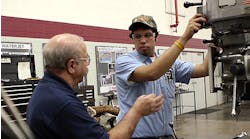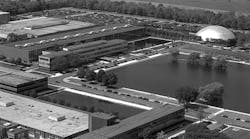An image came to mind in the course of my interview with the latest individual to be recognized by addition to the FM&T Hall of Honor, our annual presentation, the fundamental purpose of which is to elevate the importance of humanity in the work we all value. Our professions — our work — are all business-to-business propositions, and we too frequently lose ourselves in the details of those agendas, or in the science that governs the work, or perhaps in the technology that makes the work possible.
But, the image that filled my imagination is of the General Motors Technical Center, the mile-square research campus inaugurated in 1956 and home still to thousands of engineers, designers, and technicians, assigned to countless projects.
With no disregard for the great potential ongoing there now, the image in my mind is fixed at about 1964, when the installation was still a fresh expression of Mid-Century Modern architecture and planning, the very embodiment of stylish pragmatism and hopeful progress. More than that, the image represents the notion that we can have trust in experts and intellects to make plans that will benefit all of us, individual and society alike, with no concern that my choices, my ideals, or my moral standards might be infringed or compromised.
As I indicated, it’s just an image. How different is the reality that we inhabit each day? Commerce is the basis of nearly every relationship outside of our homes. We cannot conduct any sort of social or commercial transaction without the assistance of vast networks, which connect us to each other, to unknown interlocutors, and to vast archives — including the records of our own private transactions that must be sealed even from ourselves by multiple layers of encryption and time-delimited access codes. It’s a dull, cynical reality, the only (dubious) advantage of which seems to be the speed at which some of our tasks are completed. Personal rewards are limited to incentive offers.
But in that image, in that past I imagine, GM’s campus of geniuses were collaborating not just on Corvettes but on turbocharged engines and anti-lock breaks, and on magnetics, refrigeration, and fuel cells, and hundreds of other applications — meaning their achievements stand as a counterpoint to all the stressful frivolity that our current age represents.
I also think I know why this is so: the image of collaboration and trust is intrinsically more encouraging than the isolation and doubt we all know too well in the work we do. It doesn’t matter at all whether my image of mid-century optimism has any basis in reality, if it happened or not; it matters greatly that we have established a society in which we must idealize optimism in order to identify it.
More than that, the ideals we have (or seem to have) now are hollow and unfulfilling. The speed of a transaction cannot compensate for a poor result or ill treatment. The time we save is merely consumed by the next obligation, or expectation. Simply cutting costs is not progress; it is an adjustment. Some people dream of entrepreneurial success, but working alone is no assurance of a reward, and no compensation for the lost opportunity of another person’s contribution to our progress.
None of this is to discount the accomplishments that many people make each day, but these are coming at an increasingly high cost. We speed up to meet the demands of our tasks, and we sacrifice our individual insights, judgments, or improvements. Work is important, but not more important than the reward we should hope to gain from it — which is not profit, but progress. If we don’t progress, if we don’t grow more hopeful about our circumstances, we must address what we have accomplished instead.









